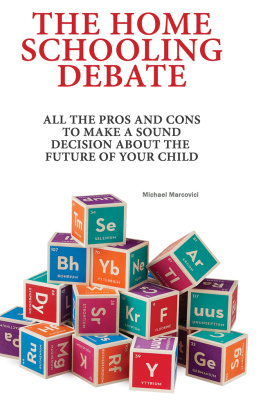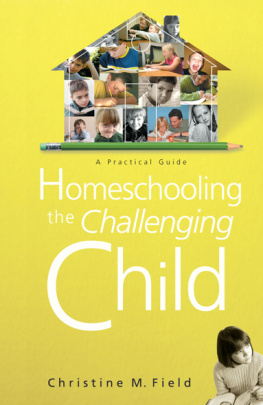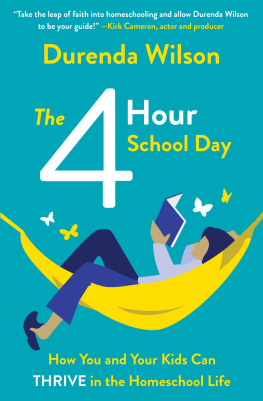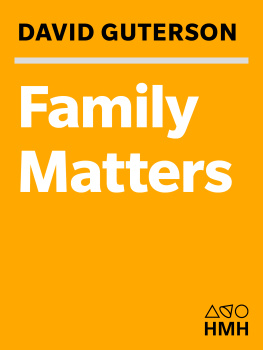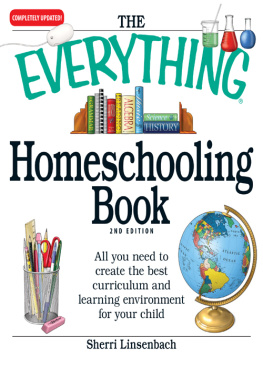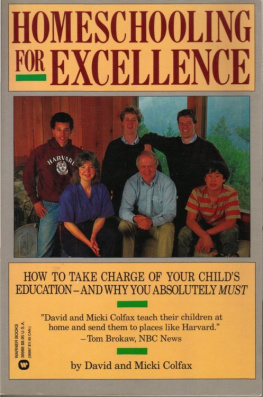2013 Michael Marcovici
ISBN 978-3-7357-5582-7
Herstellung und Verlag: BoD Books on Demand GmbH, Norderstedt
Bibliografische Information der Deutschen Nationalbibliothek: Die Deutsche Nationalbibliothek verzeichnet diese Publikation in der Deutschen Nationalbibliografie; detaillierte bibliografische Daten sind im Internet ber www.dnb.de abrufbar.
CONTENTS
HOMESCHOOLING A USEFUL ALTERNATIVE OR DAMAGING DEVIATION?
Estimates suggest there are around 1.5m Americans who have turned to homeschooling for their children (and this is probably a significant underestimate). Whether this is due to a perceived failing in the state education system, religious or political convictions or the need to accommodate some special need of the student or family, it is an issue that causes controversy and, undoubtedly raises very serious questions about the state of future generations of American citizens. Advocates of the system claim it improves the education of the child, shapes it more to their needs and aptitudes and leads to a more rounded individual experience. Critics claim it undermines the public school system, makes children more narrow and prejudiced in their outlook and doesnt offer any significant advantages academically.
So who is right? As with all such debates there is a high degree of subjectivity involved when assessing claims and counterclaims. It is difficult to substantiate or disprove a lot of these and not enough objective, scientific research has been conducted to come up with conclusive results either way. Many who have used the system are very happy with the results though they assert it is hard work and requires lots of commitment (and often cost). A few are honest enough to admit there are considerable drawbacks and that the concept is not suitable for everyone adults or children.
A lot of its critics are opposed to it on political grounds claiming it is a reactionary idea that breeds inequality and perpetuates right-wing principles. Others oppose the association with religious beliefs, though there is no strong evidence that this is a major factor in most decisions to homeschool.Homeschooling has had a long, hard road to acceptance. It has been equated with truancy and illegality and has been criticized and pilloried often by people who know little about it. Its practitioners have been branded as kooks, religious fanatics, right-wing pedagogues and many other things. Some of these accusations might be founded but the average homeschooler is probably none of these. In fact they are probably just that average. Many will agree it is a parents right to give their children the best possible education and it is an issue of choice, freedom and independent thinking. Whether this is largely beneficial or detrimental will ultimately be down to the perspective of individuals as they consider the pros and cons. And, perhaps, some time in the future, an objective assessment of academic and personal outcomes will be possible too.
PEABODY JOURNAL OF EDUCATION, 82(2-3), 387409
Copyright 2007, Lawrence Erlbaum Associates, Inc.
1
WHAT HAVE WE LEARNED ABOUT HOMESCHOOLING
Eric J. Isenberg, Mathematica Policy Research
This article discusses quantitative research on homeschooling, including the available data, pitfalls of using the data, estimates of the number of homeschooled children, part-time homeschooling, and why families homeschool. I compare research on homeschooling to research on charter schools, voucher programs, and private schools.
The number of homeschooled children is over 1 million, more than 2% of the total number of school children and roughly equal to the total in charter schools and voucher schools combined. There is approximately one homeschooled child Despite its size, scarce data on homeschooling have impaired our understanding of even the most basic questions, including a precise estimate of how many homeschooled children there are, why families homeschool, and how families combine homeschooling with using con-ventional schools. The political history of homeschooling has constrained the data that can be collected at the state level, so that the most useful data on homeschooling derive from national phone surveys, especially the National Household Education Survey (NHES). The combined insights gained from the NHES and other data sets allow us to glimpse answers to the questions of how many, why, and how parents homeschool their children.
History
Modern homeschooling began in the 1970s with a dual impetus, one group fervently religious and the rest might .
During the 1980s, religious and secular homeschoolers worked as allies to establish legal rights for homeschooling at the state level. Many school districts following mandatory school attendance laws initially treated homeschooling as a form of truancy; some early contacts between public school authorities and homeschoolers were antagonistic. Home-schoolers responded by forming support networks and pursuing legal and political channels to legalize homeschooling (Cibulka, 1991). In 1983, former Moral Majority leader Michael Farris founded a national organization, the Homeschool Legal Defense Association (HSLDA), to provide lobbying and legal assistance to evangelical Protestant homeschoolers. In Florida, homeschoolers organized themselves into a statewide organization with an elected chairperson and 12 elected regional officers. Through a combination of favorable state judicial decisions and statutes, homeschooling became legal in every state. The establishment of favor-able laws for homeschooling demonstrated how a small, organized inter.
Even at the national level, homeschooling lobbyists could exert a powerful influence. An amendment to the reauthorization of the Elementary and Secondary Education Act in the House of Representatives in 1994 to require that each full-time teacher be certified in their subject area aroused passionate disapproval from homeschoolers, who saw this as a means by which states could interfere with homeschooling by imposing this rule on parents. Homeschooling families made hundreds of thousands of phone calls to their representatives, and the House defeated the amendment 4241 (Stevens, 2001). When the Elementary and Secondary Education Act came up for reauthorization in 2001under what came to be known as the No Child Left Behind ActCongress banned any of its provisions from applying to homeschooling.
The establishment of a legal right to homeschooling combined with the expansion of the Internet to energize a growth spurt in home-schooling in the mid-1990s. The Internet eased the delivery of home-schooling materials and better connected homeschooling families. As homeschooling grew, the alliance between secular and religious homeschoolers fractured, but homeschooling support groups of both types proliferated (Stevens, 2001).
Homeschooling Data
The main barrier to research on homeschooling has been lack of data. Administrative data allows researchers to analyze charter schools (Hill, Angel, & Christensen 2006). Similarly, the relatively few voucher programs in the United States have received scrutiny (McEwan, 2004). There has been extensive research on the effect of private schooling on outcomes by using panel data such as the National Longitudinal Survey of Youth, High School and Beyond, or National Education Longitudinal Study (Neal, 1998, 2000).
The wealth of school administrative data available to study public schools or publicly funded voucher programs precludes a study of homeschooling because by definition the population of interest is absent from the data. Similarly, panel data sets cannot be employed to study homeschooling as they have been used to study private schooling. Older data sets like High School and Beyond did not include questions about homeschooling. More recent data, like the Panel Study of Income Dynamics 1997 Child Development Supplement, Children of National Longitudinal Survey of Youth 1979, and National Longitudinal Survey of Youth 1997, include questions about homeschooling, but the sample sizes are too small to create a large enough subset for studying homeschooling.
Next page
